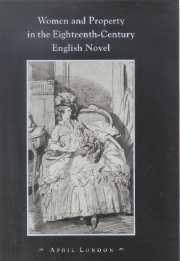Book contents
- Frontmatter
- Contents
- Acknowledgements
- Introduction
- PART I SAMUEL RICHARDSON AND GEORGIC
- PART II PASTORAL
- PART III COMMUNITY AND CONFEDERACY
- PART IV THE POLITICS OF READING
- Introduction
- 9 The discourse of manliness: Samuel Jackson Pratt and Robert Bage
- 10 The gendering of radical representation
- 11 History, romance, and the anti-Jacobins' “common sense”
- 12 Jane West and the politics of reading
- Epilogue
- Notes
- Bibliography
- Index
12 - Jane West and the politics of reading
Published online by Cambridge University Press: 14 October 2009
- Frontmatter
- Contents
- Acknowledgements
- Introduction
- PART I SAMUEL RICHARDSON AND GEORGIC
- PART II PASTORAL
- PART III COMMUNITY AND CONFEDERACY
- PART IV THE POLITICS OF READING
- Introduction
- 9 The discourse of manliness: Samuel Jackson Pratt and Robert Bage
- 10 The gendering of radical representation
- 11 History, romance, and the anti-Jacobins' “common sense”
- 12 Jane West and the politics of reading
- Epilogue
- Notes
- Bibliography
- Index
Summary
In the concluding pages of A Tale of the Times (1799) Jane West disparages the literary form she herself has adapted to her defense of domestic virtue: “the novel, calculated, by its insinuating narrative and interesting description to fascinate the imagination without rousing the stronger energies of the mind, is [by the radicals] converted into an offensive weapon, directed against our religion, our morals, or our government, as the humour of the writer may determine his particular warfare”. As we have seen, the dedication of fiction to political purposes in fact defines the literary production of both radicals and conservatives in the 1790s as they competed for the allegiance of an audience envisioned as peculiarly susceptible to calls for institutional change. West's determination to contrive fictions capable of “rousing the stronger energies of the mind” in order to defeat Jacobin principles, however, stands in potential conflict with the idealization of private life and female inwardness her works enforce, an ideal centered on the notion that “virtues shunned observation, and only courted the silent plaudit of conscience” (Tale III.333). In each of the novels written in the 1790s, The Advantages of Education: or, the History of Maria Williams (1793), A Gossip's Story (1796) and A Tale of the Times (1799) the conflict is resolved by invoking the “muse of history” in aid of “the muse of fiction” (Tale II.5). Constructing the discourse of private life in accordance with the model afforded by linear history allows her obliquely to confirm its consonance with the forces of tradition and continuity.
- Type
- Chapter
- Information
- Women and Property in the Eighteenth-Century English Novel , pp. 185 - 201Publisher: Cambridge University PressPrint publication year: 1999



